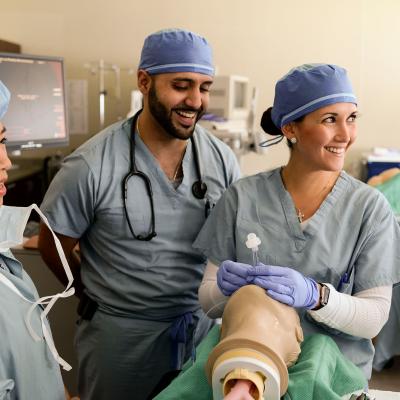- AdventHealth University

Radiologic science is a growing and exciting field that offers diverse career opportunities and strong future growth. To learn more, checkout the infographic below created by AHU Online’s Bachelor of Science in Imaging Sciences program.
What are Radiologic Technologists?
Radiologic technologists perform diagnostic imaging examinations like x-rays on patients and most work in hospitals (61 percent) and healthcare facilities. Often, many radiologic technologists progress later on in their careers to become MRI technologists. They must also be certified and licensed in order to practice.
The main career qualification for this profession is an associate degree. Individuals must also pass a primary certification exam administered by the American Registry of Radiologic Technologist (ARRT). In addition, it is recommended to have a bachelor’s degree in radiologic sciences, human anatomy or biology to further advance their careers.
The level of education as well as the geographic location of employment affects salary ranges for these professionals, and salaries may also be influenced by the level of training that a specialist has undergone in diagnostic technologies like CT scans, X-rays and MRI scans. The type of facility (laboratories, physician offices and hospitals) may also have an effect on salaries.
The average salary of an entry-level radiologic technologist is $44,500. The salary of a non-entry level specialist is $58,120. Other specialists include a cardiovascular technologist ($76,000) and a nuclear medicine technologist ($69,000). Today, the job market for radiologic technologists is continually increasing mainly due to an increase in the aging population. It is estimated that by 2022, radiologic technologist jobs will grow by 21 percent.
Radiologic Assistant
A radiologist assistant is an experienced, registered radiographer who has obtained further education and certification allowing them to serve as a radiologist extender. As a radiologist assistant, one works under the supervision of a qualified radiologist. They provide patient care and relevant services within the area of diagnostic imaging. These professionals have significantly improved the efficiency and productivity of radiology teams to match the increasing demand for quality medical imaging services.
To become a radiologist assistant, one requires a bachelor’s degree in a related field. They also need to be certified as a radiographer by a relevant professional body, which in this case is the American Registry of Radiologic Technologists (AART). Additional qualifications required include training in didactic and clinical components. This training should be supervised by a qualified radiologist mentor or a preceptor.
On top of this preceptorship, RAs are required to sit for a five-hour exam administered by ARRT. They must also continue their education in order to maintain their ARRT registration. The expected salary of a radiologist assistant at entry level is $74,455.
The benefits of RAs are numerous, hence their generous compensation. They primarily work side by side with radiologists. They offer assistance with advanced imaging procedures, and are trained to offer preliminary observations of the images taken. They also reduce the daily workload of radiologists through performing exams. This assistance increases the productivity of radiologists.
Opportunities in Healthcare Management
Radiology Manager
A radiology manager is in charge of supervising their assigned radiology department. These departments are based in a medical institution like a hospital, medical office or healthcare center. Educational requirement for this position involves a bachelor’s degree in health care management, a master’s degree in business, or healthcare administration. These qualifications allow one to become a department director or healthcare administrator.
Duties performed by a radiology manager include: supervising staff members under his/her department as well as ensuring that radiation equipment is functional, the department’s supplies are all stocked, and that their department is in line to meet organizational goals. The average salary of a radiology manager is $77,225. The annual salary range of a department manager is between $65,000 and $85,000.
Radiology managers have to meet and exceed set departmental legal requirements and quality standards. They are also tasked with developing and implementing new programs, policies and procedures. On top of this, they must periodically review and make necessary changes, at least within their departments. Managers must ensure that all employees meet the required training standards.
Radiology Instructor
A radiology instructor essentially trains radiologic students and is responsible for clinical instruction on how to perform radiographic examinations. They are also tasked with teaching students how to use radiology equipment and safety precautions that should be taken. They work closely with the program director and clinical coordinator in the implementation and assessment of clinical education.
These professionals must be well trained to be able to teach courses and coordinate programs in various radiologic sciences. They are tasked with developing, implementing and evaluating curriculum at junior colleges, technical schools and universities.
Professional qualifications required to become a radiological instructor include a Master’s degree in higher education or in healthcare education. Having a Ph.D. in a related field would be highly beneficial if the position level available is quite high. The average salary expected is $122,010. By 2022, it is estimated that the total growth of radiology instructor jobs will be 36 percent.
Radiologic Equipment Sales Manager Roles
Medical equipment sales jobs have some of the highest average incomes in the job market. This makes the jobs highly sought after by aspiring salespeople. Educational requirements for this career path include a bachelor’s degree in either life sciences or a related field. It also requires a lot of hands-on experience and patience. The highest average incomes are reported by professionals who are in their 30s with over 5 years of experience in the profession. The average salary for sales managers is $202,368.
Sales manager roles dealing with the supply and sale of medical equipment come with numerous benefits on top of the high average incomes. These perks include car allowances and company cars, provision of expense accounts, stock options as well as handsome 401ks. It is safe to say that sales managers generally have high job satisfaction rates compared to other medical professions.
Radiology science professions have increased steadily since 2002. This is due to the realization that these fields were under-served while the aging population in the United States was rising. Providing career advancement opportunities for professionals in radiation technology will eventually lead to professional confidence, job satisfaction and increased employee morale. These factors will encourage new recruits while maintaining skilled professionals.


